お問い合わせ先
Research Cooperation Division I,
International Program Department,
Japan Society for the Promotion of Science (JSPS)
5-3-1 Kojimachi, Chiyoda-ku, Tokyo 102-0083, JAPAN
TEL
+81-3-3263-1944
TEL
fos*jsps.go.jp
Note: Please replace*with @.

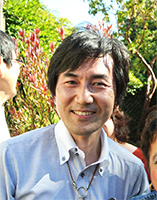 |
Tohru Yoshihisa Past participation in the FoS program |
|---|
It has been 12 years since I first attended the 7th Japanese-American FoS (JAFoS) symposium held in 2004 in Irvine, California. I remember it was early December and the Christmas tree decorations on the National Academy of Sciences’ Beckman Conference Center exuded a calm sense of splendor. It gave me a glimpse at the difference in the quality of prosperity between Japan and the United States.
Looking forward to an interesting experience, I was excited when arriving at the venue. That high was however not long lived. As soon as the symposium had started, I was overwhelmed by the interdisciplinary sessions all conducted in English with the American participants spurring on the discussions with great vigor. What I could do was just to survive in my 1st FoS symposium. Then, by the strangest twist of karma, I was asked to become a member of the planning group that would plan the next year’s symposium. In the year following that, I served as one of the symposium’s PGM Co-Chairs. Over the course of participating in these three symposia, I experienced an exhilaration and scientific stimulation of rare intensity, and enjoyed exchanges with both Japanese and overseas researchers whom I normally wouldn’t have had the chance to meet. No longer in the least bit uncomfortable, I became absorbed in the FoS program.
The clash of bewilderment and exhilaration that permeates FoS activities may only be realized by those who have participated in the program. Consider a case where two researchers in the very different disciplines of cell biology and cosmology are assigned to intertwine cutting-edge topics in their respective fields. I suppose that common sense would dictate, “It can’t be done.” Where should they start a discussion that exchanges basic knowledge on the smallest units of life and the largest systems of the universe? What the FoS program demonstrates is how surprisingly this can be done given enough effort. This is a very special feature of FoS symposia. That takes me back to the 2004 symposium in which I as a life scientist working on a cellular level found myself burning the midnight oil in a discussion on ‘dark energy’ on the far edges of physics—spurred on with infusions of alcohol.
For a session speaker, this experience is something like a one-against-many contest between different schools of the martial arts. It is very different than standing in front of an audience that knows you well. If you fail in the introduction section of your talk, the audience may be lost throughout your presentation. If you dwell too long on the basics, time limits may keep you from getting to the crux of the cutting edge. Normally, there are elementary points that can be cut short by saying “As you know,” in usual symposia you attend. As, however, the audience are novices in the subject field, this won’t work in FoS. Nor, detailed data can be used to create a smokescreen. This is because there is an enough discussion period, the same length as the presentations, to probe whole the presentations for the audience. This discussion time is the heart of FoS symposium. Though the participants in the sessions hail from different disciplines, they are all top runners in their fields. Some are from physics or mathematics while others are from the life sciences, and even from the social sciences. Being young, they have pliant minds. Thinking oneself to be the all-knowing specialist in the field and underrating these scintillating non-specialists can invite a petrifying experience. Without prior knowledge of specialized details, they can pitch knife-edge questions as if wielding a sword over your head. Failure to respond can mean a fatal blow. Therefore, FoS symposia are not just an interdisciplinary exchange but can be as fierce as a mixed martial arts contest.
Needless to say, it’s not just the speakers who engage in the session’s sword fights. The participants are the main actors in the discussions. Leading topics in the symposia, excellent dished for discussions, are carefully selected by the PGMs in advance. One may initially feel that he or she has no relationship at all with the topics to be covered in a session, but soon becomes oriented through the session chair’s introduction. I have been impressed by the art of communication demonstrated by the many chairs in carrying out this not-so-easy task. Upon receiving these introductions, the spirited young researchers explain their own cutting-edge sciences. How could this not be exciting? It is the nature of researchers to want to learn about things they don’t know, and to explore realms they can’t understand. Free from the conceptual fetters of their own fields, the researchers can delve into the session topics from a trajectory of pure curiosity. Suppressing feelings of embarrassment and mustering the courage to ask simple questions, the participants can engage leading-edge researchers on a specialized theme in vigorous discussions. It’s a lot of fun when a question one dared to ask penetrates the core of an issue, igniting a lively discussion. Some members may initially hesitate to jump in but once the discussion gets rolling, time passes as if on the wings of arrows.
What’s more, the symposia offer a platform for bilateral exchange, most notably cultural exchange. We Japanese are a bit handicapped when it comes to fluency in speaking English, the working language, as compared to European and American researchers. Therefore, we need to put ourselves in the top gear from the beginning. Otherwise, we might be slow in catching the drift of an interest discussion. Whereas science is said to be borderless, I’ve found that way individual researchers’ think is influenced by their society, culture and language. It is natural for researchers of various countries to have a similar presentation style, Q&A contents and research perspective. However, when it comes to discussions, their respective nationalities reveal themselves. This is another interesting aspect of FoS symposia, which can give birth to unanticipated interrelationships. Though FoS symposia can be tough events, there is a great deal to be gained when time is taken to immerse oneself in them.
I am still engaged in the FoS program as a member of JSPS FoS Advisory Board. It’s a great pity that the board members have no right to participate in the session discussions; we just sit in the back of the room and observe during the sessions. I suppose all the board members share this thought. In my view, few scientists dislike discussions and arguments. Moreover, FoS is truly interesting in a way it simply fascinates curious minds. For the participants, FoS symposia are unique in terms of the opportunities they afford to create interpersonal relationship across scientific fields, which can be career enhancing. This is especially the case when it comes to excellent young researchers. As they go on to work at the nucleus of various organizations in the future, the interpersonal networks they form early on can be very beneficial. This point is often discussed in FoS program planning.
In addition, such interdisciplinary exchange might help to define one’s positioning as a researcher. This is especially true in this day and age when the minute subdivision of research fields makes it harder than might be expected to identify one’s place within the scientific milieu. It’s a good idea to occasionally step back and check his or her own position in the whole sciences: By assessing where one’s research is heading, a researcher can prevent it from stalling out. FoS symposia provide an ideal opportunity to do this. Over the course of participating in their well-rounded discussions, a researcher may find ways to pinpoint his or her own place within an overall mosaic pieced together by other researchers’ activities in various fields. FoS may provide a researcher with opportunities to think where the scientific themes in the symposia should be placed to complete the whole mosaic of his or her scientific world from objective points of view, even though such themes may be far from his or her research fields. Such activities in FoS symposia can garner valuable hints about the positioning and direction of his/her own research, and of himself/herself. As having been one of those participants myself and now a member of the JSPS FoS Advisory Board, I look forward with great anticipation to more and more researchers expanding the horizons of their research through participation in FoS symposia.
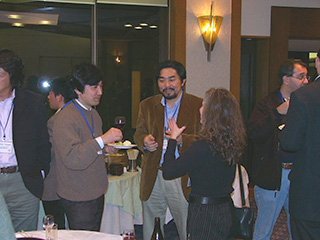 |
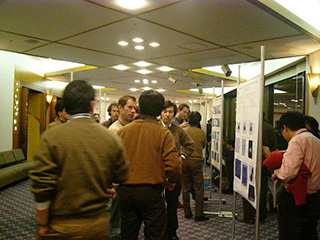 |
|
|
【8th JAFoS symposium:Reception (left), Poster Session (right)】 |
||
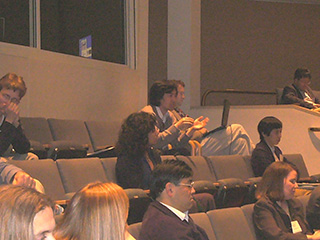 |
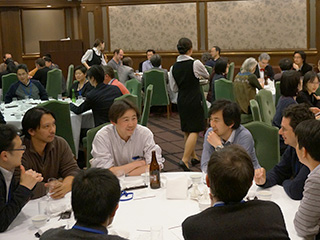 |
|
|
【9th JAFoS symposium: Discussion Session】 |
【9th JFFoS:Prof. Yoshihisa joins in casual conversation with participants】 |
|